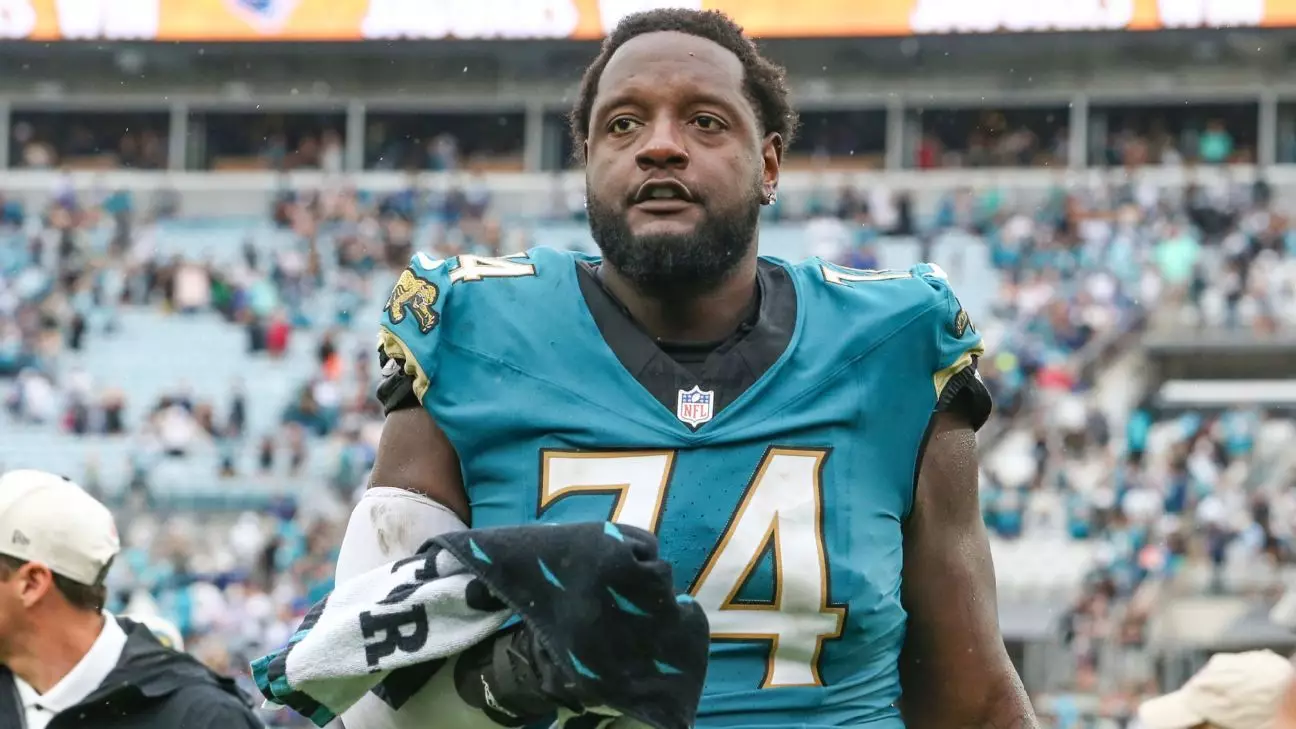In a bold move to solidify their offensive line, the Minnesota Vikings have acquired left tackle Cam Robinson from the Jacksonville Jaguars. This trade comes on the heels of a significant injury to starting left tackle Christian Darrisaw, who suffered a torn ACL and MCL during a recent game against the Los Angeles Rams. With this acquisition, the Vikings not only address an immediate need on their roster but also set the stage for potential strategic adjustments as they aim to maintain their momentum in the current season.
Darrisaw’s injury is a serious blow to the Vikings, who have surprised many with their strong 5-2 record thus far. The organization has recognized the urgency of the situation, as Darrisaw had just signed a lucrative four-year extension worth as much as $113 million, reflecting his vital role in the team’s offensive scheme. With Darrisaw expected to be sidelined for the remainder of the season, bringing Robinson on board is a pragmatic response driven by necessity.
Details of the Trade and Financial Considerations
The trade not only brings Robinson, 29, into the fold but also entangles financial intricacies that both teams must navigate. Robinson, who is in the final year of a contract earning him $16.25 million, will see a portion of his salary covered by the Jaguars. The conditional picks exchanged add further complexity; the Vikings are set to receive a seventh-round pick in 2026, while the Jaguars could obtain a fifth-round selection that has the potential to escalate to a fourth based on Robinson’s playing time.
Such conditional picks reflect both teams’ willingness to operate on the projected effectiveness of the players involved, indicating how contingent roster decisions can significantly impact future draft strategies.
Robinson’s arrival raises questions regarding his immediate role in the lineup and how this impacts the overall dynamics of the offensive line. Notably, his tenure with the Jaguars has been marred by inconsistency, having played only one full season since being drafted in 2017. Over the years, Robinson’s career has been plagued by injuries, suspensions, and recent benching, prompting scrutiny over his readiness to contribute effectively for the Vikings right away.
Vikings’ head coach Kevin O’Connell has hinted at considering various options for the left tackle position, despite Robinson’s experience. Veteran backup David Quessenberry filled in for Darrisaw during the game against the Rams, while the possibility of maneuvering Blake Brandel to the left tackle spot remains on the table. This multi-faceted approach serves to highlight the Vikings’ desperate attempt to optimize their offensive line while navigating complex personnel decisions.
Robinson’s performance metrics present a mixed bag; while he boasts an impressive career pass block win rate of 81.7%, it remains to be seen whether he can replicate—or improve upon—this level of performance in a new environment. His recent suspension and a knee injury have raised red flags regarding his reliability, leading fans and analysts alike to question whether he will be able to step in and deliver under the pressure of a playoff-contending season.
It is also essential to consider the psychological impact on Darrisaw, who has faced multiple injuries since entering the NFL. His journey serves as a cautionary tale for Robinson, emphasizing the unpredictable nature of player health in professional sports. With Darrisaw likely sidelined until the next season, Robinson becomes a crucial short-term asset whose performance could significantly alter the Vikings’ playoff outlook.
Ultimately, the Vikings’ acquisition of Cam Robinson reflects a calculated risk driven by immediate needs and potential long-term benefits. As the organization adapts to the loss of a critical player, all eyes will be on Robinson to determine if he can be the bridge to sustain Minnesota’s success during Darrisaw’s absence. Both teams have intricate challenges ahead, but the Vikings’ decision underscores a broader narrative in the NFL—how adaptive strategies can redefine success amidst adversity.


Leave a Reply